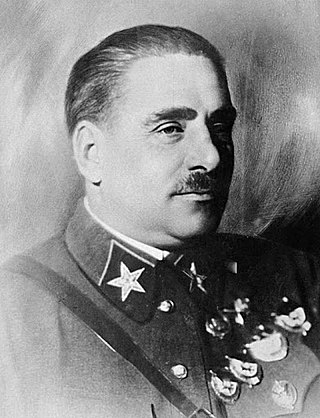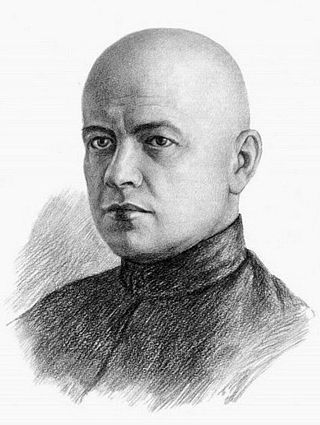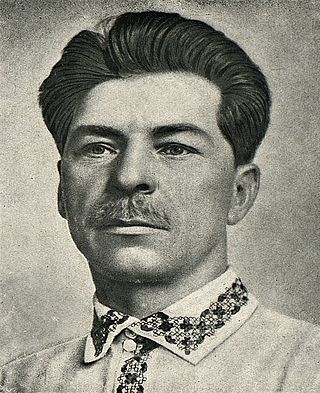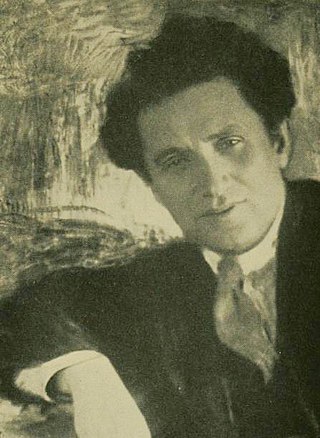
The Great Purge, or the Great Terror, also known as the Year of '37 and the Yezhovshchina, was Soviet General Secretary Joseph Stalin's campaign to consolidate his power over the Communist Party of the Soviet Union and Soviet state. The purges also sought to remove the remaining influence of Leon Trotsky. The term great purge, an allusion to the French Revolution's Reign of Terror, was popularized by the historian Robert Conquest in his 1968 book The Great Terror.

The Communist International (Comintern), also known as the Third International, was an international organization founded in 1919 that advocated world communism, and which was led and controlled by the Communist Party of the Soviet Union. The Comintern resolved at its Second Congress in 1920 to "struggle by all available means, including armed force, for the overthrow of the international bourgeoisie and the creation of an international soviet republic as a transition stage to the complete abolition of the state". The Comintern was preceded by the dissolution of the Second International in 1916.

Lazar Moiseyevich Kaganovich, was a Soviet politician and administrator, and one of the main associates of Joseph Stalin. He was one of several associates who helped Stalin to seize power.

Vasily Konstantinovich Blyukher was a Soviet military commander and Marshal of the Soviet Union.
The 28 Bolsheviks were a faction in the early Chinese Communist Party (CCP). The faction was formed among Chinese Communists studying at the Sun Yat-sen University in Moscow during the late 1920s and early 1930s. They received their nickname because of their strong support for the orthodox political positions advocated by Joseph Stalin and Pavel Mif. The leaders of the faction included Wang Ming, Bo Gu, Luo Fu, He Zishu, Wang Jiaxiang, and Shen Zemin. Sun Yat-sen University closed in 1930 and the students made their way back to China.

Stanisław Vikentyevich Kosior, sometimes spelled Kossior, was a Soviet politician who was First Secretary of the Communist Party of Ukraine, Deputy Premier of the Soviet Union and member of the Politburo of the Communist Party of the Soviet Union (CPSU). He and his wife were both executed during the Great Purge.

Aleksandr Sergeyevich Shcherbakov was a Soviet politician and statesman who was a wartime head of the Main Political Directorate of the Red Army as well as the director of the Soviet Information Bureau.

Vladimir Alexandrovich Antonov-Ovseenko, real surname Ovseenko, party aliases 'Bayonet' (Штык) and 'Nikita' (Никита), literary pseudonym A. Galsky, was a prominent Bolshevik leader, Soviet statesman, military commander, and diplomat.

Andrei Sergeyevich Bubnov was a Russian Bolshevik revolutionary leader, one of Bolshevik leaders in Ukraine, Soviet politician and military leader and member of the Left Opposition.

Pavel Petrovich Postyshev was a Soviet politician, state and Communist Party official and party publicist. He was a member of Joseph Stalin's inner circle, before falling victim to the Great Purge. In 2010, a court in Kyiv judged Postyshev guilty of complicity in genocide because of his part in causing the mass starvation in Ukraine in the early 1930s, known as the Holodomor.

Mykola Oleksiiovych Skrypnyk, was a Ukrainian Bolshevik revolutionary and Communist leader who was a proponent of the Ukrainian Republic's independence, and later led the cultural Ukrainization effort in Soviet Ukraine. When the policy was reversed and he was removed from his position, he committed suicide rather than be forced to recant his policies in a show trial. He also was the Head of the Ukrainian People's Commissariat, equivalent to the modern-day position of Prime Minister of Ukraine.
Communist Party of Western Ukraine was a political party in eastern interwar Poland. Until 1923 it was known as the Communist Party of Eastern Galicia.

Joseph Stalin started his career as a radical student, becoming an influential member and eventually the leader of the Bolshevik faction of the Russian Social Democratic Labour Party. He served as the General Secretary of the Central Committee of the Communist Party of the Soviet Union from 1922 until his death in 1953.

Karl Berngardovich Radek was a revolutionary and writer active in the Polish and German social democratic movements before World War I and a Communist International leader in the Soviet Union after the Russian Revolution.

Grigory Yevseyevich Zinoviev was a Russian revolutionary and Soviet politician. An Old Bolshevik, Zinoviev was a prominent figure in the leadership of the early Soviet Union and served as chairman of the Communist International (Comintern) from 1919 to 1926.

Lev Borisovich Kamenev was a Russian revolutionary and Soviet politician. He was born in Moscow to parents who had both been involved in revolutionary politics in the 1870s. He joined the Russian Social Democratic Labour Party (RSDLP) in 1901 and was active in Moscow and Saint Petersburg. Kamenev participated in the failed Russian Revolution of 1905. Relocating abroad in 1908, he became an early member of the Bolsheviks and a close associate of the exiled Vladimir Lenin. In 1914, he was arrested upon returning to Saint Petersburg and exiled to Siberia. Kamenev was able to return after the February Revolution of 1917, which overthrew the Tsarist monarchy. In 1917, he served briefly as the equivalent of the first head of state of Soviet Russia. He disagreed with Lenin's strategy of armed uprising during the October Revolution but nevertheless remained in a position of power after the fall of the Provisional Government. In 1919, Kamenev was elected a full member of the first Politburo.
On the Cult of Personality and Its Consequences, popularly known as the Secret Speech, was a report by Soviet leader Nikita Khrushchev, First Secretary of the Communist Party of the Soviet Union, made to the 20th Congress of the Communist Party of the Soviet Union on 25 February 1956. Khrushchev's speech was sharply critical of the rule of the deceased General Secretary and Premier Joseph Stalin, particularly with respect to the purges which had especially marked the last years of the 1930s. Khrushchev charged Stalin with having fostered a leadership cult of personality despite ostensibly maintaining support for the ideals of communism. The speech was leaked to the West by the Israeli intelligence agency Shin Bet, which received it from the Polish-Jewish journalist Wiktor Grajewski.

David Petrovsky (Lipetz) (also known as Max Goldfarb, Bennett, Humboldt, Brown, September 24, 1886, Berdychiv, Russian Empire — September 10, 1937, Moscow, Soviet Union) was a Jewish revolutionary politician, economist, journalist, general of the Red Army, and Soviet statesman. He was an active member of the Jewish Bund in the Russian Empire and the Jewish Socialist Federation in the USA. In 1912 he received a Ph.D. in economics from the Free University of Brussels where he studied under Emile Vandervelde. He moved to New York in 1913 where served as the editor of the Jewish Daily Forward newspaper in New York until 1917. In 1917 Petrovsky ran the Russian Constituent Assembly and returned to Ukraine. He was elected a member of the Central Council of Ukraine, its Central Executive Committee (Mala Rada), where he voted for the separation of Ukraine from Russia. He also served as a mayor of Berdichev, a city with the largest Jewish population in the Russian Empire and Ukraine. As a mayor, he managed to prevent planned large Jewish pogroms in the city between 1917-1919. Petrovsky joined the Red Army in 1919 and eventually became a General of the Red Army where he was responsible for all military education in the Soviet Union. General Petrovsky led the Directorate of Military Education in the Red Army from 1919 to 1924 and co-founded the Governmental Committee for the Fight against Antisemitism in Russia and the Soviet Union. Petrovsky was a member of the Presidium of the Executive Committee of the Communist International from 1924 to 1929 where he was responsible for the formation of communist parties in Great Britain and France. From 1929 to 1937 Petrovsky served as a member of the Presidium of the Supreme Soviet of the National Economy in the Soviet Union. From 1929 to 1937 he headed the General Directorate of Higher and Secondary Technical Education in the Soviet Union where he was responsible for the creation of several hundred universities and technical schools across the Soviet Union that prepared engineers and technical personnel in the accelerated push for the industrialization of the Soviet Union. Petrovsky was arrested and executed during Stalin’s Great Purge in 1937 in Moscow. He was posthumously rehabilitated in the Soviet Union in 1958 as a victim of political repression.

Alexander Yakovlevich Shumsky or Oleksandr Yakovych Shumskyi was a Ukrainian communist and activist. He was one of the leaders of the national communism movement in Ukraine and actively supported Ukrainization. He was one of the victims of the Stalinist regime, being arrested and killed by the NKVD in 1946. He was rehabilitated in 1958, during the period of De-Stalinization.

Pavel Fyodorovich Yudin was a Soviet philosopher and Communist Party official specialising in the fields of culture and sociology, and later a diplomat.

















